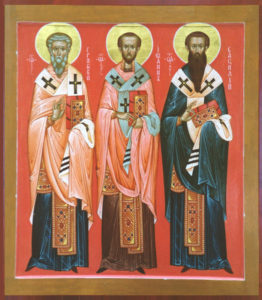Commemoration of Basil the Great of Caesarea, Gregory of Nazianzus, and Gregory of Nyssa, Pastors and Confessors
January 10

The three men commemorated this day are two brothers (Basil, bishop of Caesarea, and Gregory, bishop of Nyssa) and a close friend (Gregory, bishop of Nazianzus). They collectively are known as the “Cappadocian fathers” since they grew up together in Cappadocia (all born around AD 330) and were steadfastly and stubbornly united in their orthodox confession of the blessed Trinity.
Toward the end of his little work De Spiritu Sancto (On the Holy Spirit), in which he defended the true deity of the Third Person of the Trinity, St. Basil penned these words: “I was taught too by the children at Babylon, that, when there is no one to support the cause of true religion, we ought alone and allo unaided to do our duty. They from out of the midst of the flame lifted up their voices in hymns and praise to God, reeking not of the host that set the truth at naught, but sufficient, three only that they were, with on another” (par. 79). Though they often felt quite lonely in their struggle, these three confessors of the blessed Trinity constantly called the faithful of the Church to join them in glorifying the Father, the Son, and the Holy Spirit, of one nature, equal in majesty, though three distinct persons. No wonder Basil saw in the three children a picture of himself, his brother, and their dear friend! As the Hebrew children would not bend the knee to idolatry, neither would they.
Gregory of Nazianzus, who ended up as the Patriarch of Constantinople, was famous in his own day for preaching the Word with eloquence. Gregory of Nyssa, though in many was the most speculative of the Cappadocians, almost sounds like Luther when he exhorts his adversaries: “Let the inspired Scripture, then, be our umpire, and the vote of truth will be given to those whose dogmas are found to agree with the Divine words.”
Weedon, William Celebrating the Saints 16-17
As with many individuals, liturgical churches remember Basil and the two Gregorys on different days. So, for example, Basil the Great is commemorated on January 30 in many churches in the East. Gregory of Nazianzus is commemorated January 25 in many of those same churches but on May 9 in many churches of the West. Gregory of Nyssa is often remembered in the West on March 9 and in the East on January 10. Because there are so many people worth remembering, the Church has long chosen to remember multiple individuals on the same day. This is the practice adopted for these saints by those who put together our liturgical calendar.
A prayer by Basil the Great of Caesarea
Remember, O Lord, this congregation present, and those who are absent with good cause; have mercy upon them, and upon us, according to the multitude of Thy loving-kindness; fill their garners with good things; preserve their marriages in peace and love; take care of their little ones; lead their youth; give strength to the aged; comfort the timid and afraid; bring home the scattered, restore those who have erred; and unite them all in Thy holy catholic and apostolic Church. Succor those who are vexed with unclean spirits; go with all travelers by sea or land; protect the widow, shelter the orphan, deliver those in the mines; and those in exile; those in prison, distress or poverty, or any kind of trouble. Remember all who stand in need of Thy pity; those that love us; those that hade us; those who desire our prayers, unworthy though we be to offer them to Thee. Remember, O Lord, all Thy people, and pour upon them an abundance of Thy goodness, granting all their prayers unto salvation. All those whom we have not remembered through ignorance or forgetfulness, or through the multitude of their names, do Thou Thyself call to mind. O God, who knowest the name of each even from their mother’s womb. For Thou, O Lord, art the Helper of the helpless; the Hope of the homeless, the Saviour of the tempest-tossed, the Harbor of the voyager, and the Physician of the sick. Be Thou all things to all Thy children; for Thou knowest them all, their petitions, their dwellings, and their minds. Amen.
